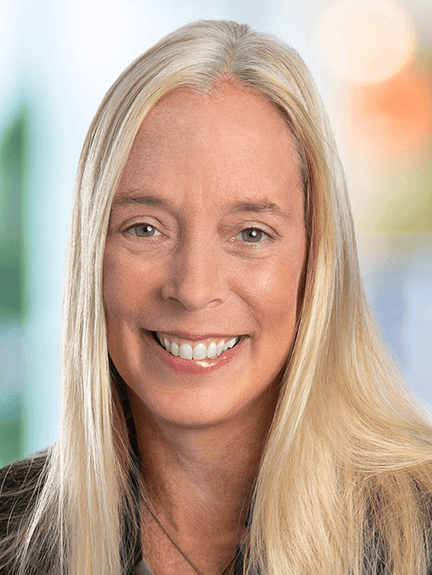DTCC is committed to fostering the next generation of technology talent, and to actively partnering with organizations focused on diversity, equity, and inclusion (DE&I) and science, technology, engineering, and math (STEM).
DTCC Connection caught up with Lynn Bishop, DTCC Managing Director and Chief Information Officer and Phil Anderson, DTCC Executive Director of Diversity & Inclusion and Corporate Social Responsibility to learn about DTCC’s academic partnerships and commitment to diverse recruiting and hiring efforts.
Related: SIFMA shares DE&I developments in the financial services industry
DC: DTCC partners with several top universities to provide rich learning opportunities in resilience and cybersecurity as well as internships to research emerging technology. What are some of the unique, mutual benefits of this partnership model?
 Lynn Bishop, DTCC Managing Director and CIO
Lynn Bishop, DTCC Managing Director and CIO
LB: DTCC is partnering with NYU’s Tandon School of Engineering to expand cybersecurity and resiliency research opportunities for undergraduate and graduate students within their Center for Cybersecurity. We are also working together to create enhanced IT Risk and Resiliency curricula that will help to equip the next generation of talent with the knowledge, tools, and skills to succeed as technology continues to transform.
We offer undergraduate internships and graduate-level capstone research opportunities to students from Duke University’s Pratt School of Engineering. Students work alongside IT leadership and gain exposure to new and emerging technologies. Students also learn firsthand how IT professionals incorporate research and experimentation to benefit DTCC, clients and the broader industry.
Working directly with universities is a mutually beneficial model. Students gain real world, hands-on, practical experience with data and technology, and firms like DTCC benefit from the fresh perspective and diverse thinking that students bring, as well as the ability to explore and advance innovative ideas that will address the challenges faced by the broader industry.
DC: With the rapidly evolving technology landscape and students more connected than ever, how is DTCC continuing to attract diverse technical talent?
 Phil Anderson, DTCC Executive Director of D&I and CSR
Phil Anderson, DTCC Executive Director of D&I and CSR
PA: At DTCC, we work with organizations that focus on recruiting diverse talent, such as Tribaja, which focuses on building a technical community around people who are African American and Latinx, and the early career focused organization Jopwell, which aggregates talent from a variety of schools across the country and helps students with training and skills development as they prepare to enter the workforce. We also work with Fairygodboss, an online community where we profile our senior women leaders and highlight our IT and STEM initiatives.
Each year we attend conferences, such as the Association of Latino Professionals for America (ALPFA), to recruit both early career and experienced tech talent. About two and half years ago, DTCC launched a work re-entry program, called Re-EMERGE. The program focuses on helping those who have been out of the workforce for two or more years to get back into the workplace. Oftentimes, candidates are women who have stepped back to focus on child or elder care, or due to health issues. There is a wealth of experience and potential in these people re-entering the workforce.
DC: How does DTCC support women in STEM careers?
PA: We have been working with Girls Who Code for over five years. The organization supports women of all ages, beginning as young as middle school to get them interested in STEM and STEM career fields, and teaches participants how to code – no experience needed. This really helps to drive the excitement and get people involved. Over the past couple of years, and even during the pandemic, DTCC had over 250 volunteers for the duration of the program. That is a record number of volunteers for any one program in our organization.
In the second year of the partnership, we realized that we needed to build a bridge for the young women in high school to eventually have an opportunity at DTCC. We are able to do that by providing year-round immersion, with curriculum focused on coding, life skills and financial literacy through our employee driven program, Rising Stars, which prepares them for our internships and a better future.
Similarly, DTCC launched a regional STEM education and training program in Chennai during the fall of 2019, called Young Women in Coding and Development. Through a partnership with a local college, Loyola-ICAM College of Engineering and Technology (LICET), we were able to identify 15 college-age women who are rising third (and final year) students, and give them a 12 week, hands on experience. The curriculum helped the students understand how coding and development translates into delivering innovative and resilient solutions for clients and the financial market. Four years later, we are now leveraging this school relationship to identify and hire technical talent for our newly launched early career program in Chennai.
Related: DTCC CEO on how we're helping inspire the next generation of IT professionals
DC: What are you looking forward to with DTCC’s academia partnerships, and can you share some recent successes?
LB: We are excited to offer the IT Risk and Resiliency curricula at NYU Tandon beginning in the fall. We will also start research projects with NYU students centered on artificial intelligence (AI) and the software development lifecycle and supply chain security.
The spring cohort of capstone students from Duke University recently completed their final presentations, having had the opportunity to advance important research on digital ledger technology, quantum computing and generative AI. This summer, another group of capstone students from Duke will begin working with use cases in data science, sustainability, AI pair programming and NFTs. These use cases will be a catalyst for continued development work at DTCC.
DTCC is proud to continue providing students with real-world training and opportunities to do cutting-edge research with new and emerging technologies, especially as the technology landscape continues to rapidly evolve.
DC: How can firms continue to prioritize diversity, equity, and inclusion in early career hiring, especially within technology and engineering fields?
PA: Firms should be intentional and stay connected. Working with organizations like Girls Who Code, the National Society of Black Engineers and the Grace Hopper conference can assist in building a pipeline for diverse talent, because these organizations are driving diversity, equity and inclusion in fields that have historically lacked diversity. One of the most important things a firm can do is build bridges and create entry points for these individuals to join and continue to progress in their careers.
At DTCC, we are very committed to our DE&I efforts. We focus on casting the widest net for talent, because it does not only exist in certain pockets. By creating more avenues for access, and more opportunities for people to step forward; we’re able to recruit from a more diverse and deeper talent pool who possess a wider range of skills.
< Return to Life at DTCC